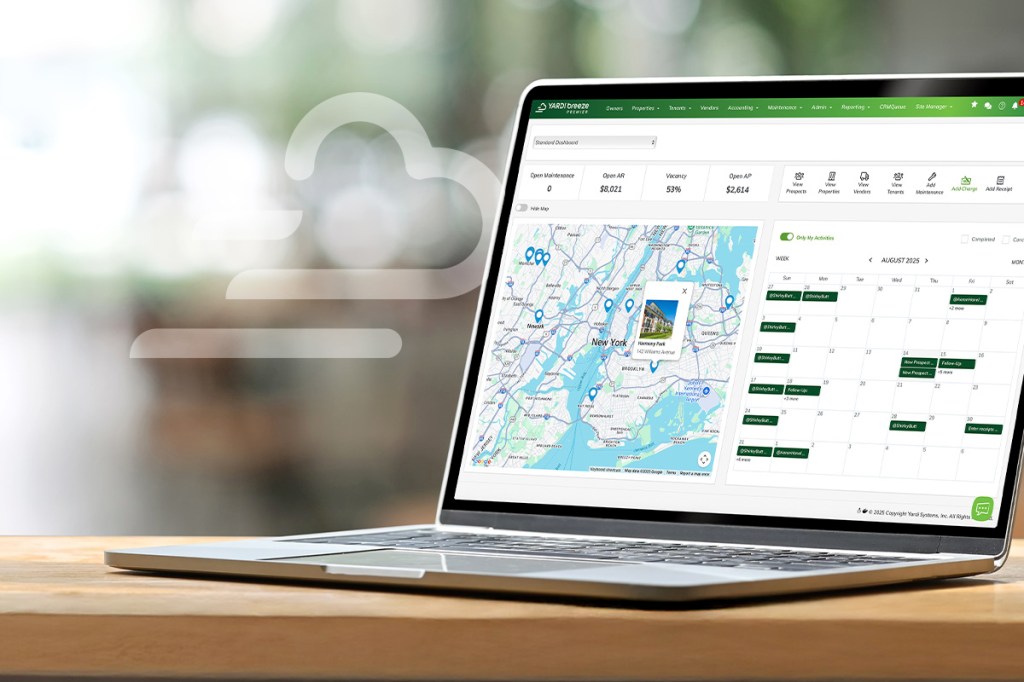
Contributed by Zac Partin, team leader at Yardi
In real estate, the clock can be your worst enemy. That’s precisely why good time management skills are your best friend. I was a property manager for 10 years before I moved over to the software industry, so I know the struggle you face. I know that no one really teaches you how to properly manage your time, but it’s a skill that’s expected of you, nonetheless.
If you feel overwhelmed more often than not, a little time management will go a long way. I’m going to give you the plan I used to stay sane and productive. A good routine is the difference between long, late nights and restful, happy weekends.
You’ll have daily goals, weekly goals, monthly goals and annual budgeting goals. It all starts by blocking off hourly, daily, weekly and quarterly routines — and sticking to them. We’ll look at a sample schedule you can use or borrow from.
Key takeaways
| Frequency | Time block | Tasks |
|---|---|---|
| Daily | 8–10 a.m. | Property safety & appearance: walk & inspect property, address hazards, set goals for the day |
| 10 a.m.–12 p.m. | Leasing, returning calls, scheduling tours, marketing, using CRM & listing software | |
| 12 p.m. (lunch) | Team lunch / staggered breaks to avoid shutdowns | |
| 1–3 p.m. | Admin tasks: progress review, financial reports, rent rolls, delinquencies, resident calls | |
| 3–6 p.m. | Wrap-up & prep for next day: follow-ups, vendor mgmt, invoicing/payables, resident relations | |
| Weekly | Monday & Tuesday | Clean up weekend issues, set weekly goals, adjust priorities, market surveys, renewals, leasing |
| Wednesday & Thursday | Process invoices, coding & checks, mid-week reporting, reputation management | |
| Friday | Review weekly accomplishments, plan for next week, schedule tasks & maintenance, wind down | |
| Monthly | Week 1 | Collect rent, ensure revenue goals, payment processing |
| Week 2 | Maintain momentum: pay bills, renewals, track goals | |
| Week 3 | Verify projections, continue routine tasks, vendor & maintenance follow-up | |
| Week 4 | Close books, finalize accounts, code invoices, blackout period for month-end processing | |
| Quarterly/annual | Quarter 1 | Tax prep & 1099s, ensure prior year financials are clean |
| Quarters 2 & 3 | Routine daily/weekly/monthly work | |
| Quarter 4 | Budget prep, expense & revenue review, CAM reconciliation, budgets for next year |
Sample hourly routine
Property safety & appearance: 8 to 10 a.m.
The morning is about understanding what happened the night before, setting clear objectives for the team and getting ahead of immediate issues. Typically, this takes an hour or two.
The other important part of the morning routine happens when you first arrive at the property, even before entering your office. You should walk around and inspect the property, making sure there are no safety hazards like exposed wiring, loose railings, damaged walkways, pest infestations or faulty lighting. Having a mobile property management app allows you to take photos and generate maintenance requests in real time.
Basically, make the main goal of the morning about ensuring the property is safe, clean and attractive. This is critical because you’re constantly marketing your property. Prospective residents will visit today, tomorrow or soon, all deciding if they want to live there. So, mornings are really focused on property safety, maintaining appearances and setting your team up to successfully reach the day’s goals.
Business time: 10 a.m. to noon
Late morning is crucial for leasing activities. Leasing consultants are returning calls from the night before and scheduling tours for the day. The maintenance team is working on projects assigned in the early morning.
This is also where property management software becomes particularly relevant. Software allows property managers to easily syndicate property information updates to multiple listing sites and attract prospective renters. For instance, with Yardi Breeze, information from the RentCafe tab within Breeze or Breeze Premier automatically pushes updates across all the different ILS platforms, streamlining the leasing and marketing process.
Why A CRM is key to success
If your property management software includes CRM functionality, you’ll be able to create guest cards, manage prospects, schedule tours and systematically follow up directly in the system. Without an integrated CRM, property managers have to manually handle calls, log activities by hand in a separate CRM system or even write notes in a notebook for all properties in their portfolio. I’ve experienced both methods, and once I used a CRM that was integrated within the property management system, there was no going back.
Essentially, late morning is business time. Property managers, leasing consultants and maintenance teams are all actively engaged in their tasks.
How to handle lunchtime
The fact of the matter is that your team has to eat. You have to eat. There are two ways to do this: you can shut down your office for an hour or stagger lunch breaks. Closing the office likely means playing some catchup after lunch, which is a setback to your schedule.
To prevent this, when I managed properties, I’d stagger lunch breaks. I’d send one leasing agent at 11:30 a.m., then another around 12:30 p.m., followed by my assistant manager. I tried my best to have lunch around noon, but when you’re managing multiple responsibilities — or if you’re the only manager — sometimes you take what you can get. If you don’t want a riot on your hands (or a legal issue), make sure your team takes a lunch break every day.
Admin hours: 1 to 3 p.m.
The middle part of the day should be focused on administrative tasks. You’re reviewing your progress against daily goals. Are you on track with leasing? How effective is your marketing? Is maintenance keeping pace, or are they falling behind? It’s essentially a mid-day check-in to ensure everything is running smoothly.
This is also when real-time financial reporting is important. It’s a great time to update rent rolls, check delinquency reports, call residents to collect outstanding payments, etc. If everything is current by 3 p.m., you’ve done some great work!
If you’re using property management software with integrated accounting and reporting tools, you’re going to spend less time managing these tasks. Instead, you’ll be able to focus on filling vacancies. That’s a big deal, considering most scheduled tours and prospect meetings happen in the afternoon.
Online portals simplify applications & screening
In a best-case scenario, you’d take prospects out, show them units, then return to the office to have them complete an online application. If you use Breeze or Breeze Premier, that would be the RentCafe portal.
You can walk them through the process and ask if they’d like to fill out the application. They can even use their phones to complete the process. By having them create a prospect record right then and there, you’re giving them access to the online portal they’ll use to make payments, go through the screening process, execute their lease and access tenant documents.
An integrated online portal is much easier and more efficient than paper forms or online PDFs. Not to mention, you don’t have to submit applications to a separate screening provider. Gone are the days of manually and unreliably verifying applications by calling previous landlords and property management offices. I experienced this firsthand early in my career. Trying to reach previous landlords and getting accurate information was always challenging because property managers are busy handling their own leasing issues. This significantly slows down the leasing process, increasing vacancy time and lost revenue.
The major advantage of Breeze or Breeze Premier, especially with integrated screening, is immediate notification when a screening result comes back. This is typically instantaneous.
Wrap-up & prep: 3 to 6 p.m.
At the end of your workday, you’re typically wrapping up tours, addressing any remaining issues that arose in the morning, and scheduling follow-ups for the next day. This is also a critical time for vendor management, which can be especially demanding. Depending on your property’s size and level of management, you might have multiple vendors onsite. It’s important to ensure they’re finishing their jobs promptly and correctly. You’ll also use this time for scheduling future projects and vendor communication. Breeze Premier’s vendor management features are essential for effectively handling vendor follow-ups, ensuring everything stays on schedule and is properly tracked.
Invoicing never ends
Ideally, this is when you want to try to manage invoices and payables. Realistically, it’s something property managers can do whenever there’s downtime. I found this happens either in the late morning just before lunch, or between 3 and 6 p.m. when things start to quiet down.
The accounting side of property management is an ongoing task. If you don’t have a dedicated bookkeeper, managing these responsibilities can be challenging, and you just fit them into your schedule whenever possible.
That’s where full-service invoice processing becomes incredibly valuable. It saves substantial time, streamlining the whole accounts payable workflow. Rather than manually cross-referencing multiple spreadsheets or QuickBooks throughout the day, Breeze Premier offers easily accessible, drill-down reports. You can identify charges, confirm payments and move on quickly. This dramatically simplifies daily bookkeeping tasks.
The home stretch
Most property management offices remain open a little past 5 p.m. This is when residents begin to return home from work and need to communicate with the office. Between 5 and 5:30 p.m., there’s typically an influx of residents visiting the office to discuss neighbor issues, maintenance problems, lease renewals or to give notice that they’re moving out. Resident relations become very active during this after-work, end-of-day window. This includes online communications as well.
Once again, a CRM queue like the one in Breeze Premier is invaluable during this time. It will help manage any sudden increase in resident engagement without straining your time.
In property management, no two days are ever exactly the same. What I’m laying out is just a typical day, but it can definitely vary. Having said that, let’s look at a typical week to see how property management software might be used throughout the week.
Sample weekly routine
Having a solid daily routine is important, but every day of the week is going to look a little different — even if you follow the same general pattern each day.
Monday & Tuesday
Mondays typically involve handling immediate issues and setting your team’s goals for the week. Mondays are a good time to clean up weekend issues and clearly define the week’s priorities.
The beginning of the week is when leasing consultants typically identify specific leasing targets, such as the oldest vacant units, and prioritize marketing and follow-ups around those. This is also the time to conduct market surveys to ensure your pricing is competitive. You also need to stay proactive about renewals. These general administrative tasks can be done Monday or Tuesday, depending on your schedule.
Wednesday & Thursday
On Wednesdays, I would always dedicate two or three hours in the afternoon for processing invoices. I’d gather all invoices from the previous week, code them, stamp them and mark them as payables. Afterward, I’d go through and cut checks. With Breeze Premier, this whole process is simplified. You can directly enter payables, click Pay Now and generate checks right from the system.
Mid-week and mid-month are also when property owners typically request revenue projections. They always want to know one thing: “What’s our projected revenue for the next week or month?” When you have accurate, real-time reporting, you can get those answers back in seconds.
Additionally, mid-week is important for reputation management. For example, on Wednesdays, I’d review my property management company’s Google and Yelp scores, making sure we’re responding appropriately to reviews and maintaining our property’s online reputation.
Friday
At this point, you’re exhausted and ready for the weekend. But you’re not done yet. It’s time to look back and see if you accomplished everything you set out to do for the week. Confirm whether you met your weekly goals, make necessary adjustments and plan for the next week.
Realistically, Friday serves as both a wind-down and planning day. We have a calendar feature in Breeze and Breeze Premier that’s particularly valuable for this purpose. It allows you to schedule maintenance personnel for specific jobs in advance, ensuring everything is organized ahead of time.
With any luck, you’ll be able to get everyone clocked out a little early to enjoy the weekend.
Sample monthly routine
Monthly tasks stem from your weekly cadence, but it’s still important to highlight the critical tasks of each week. If you’re new to property management or just looking to improve your time management, this schedule can help you gauge how well you’re staying on track.
Week 1: All about rent
Everyone knows rent is typically due on the first of the month. The first week usually involves collecting rent payments and making sure revenue goals are met. After all, generating income is a key responsibility as a property manager. Your daily admin tasks will probably skew more heavily toward payment processing in the first week. And because the first often occurs in the middle or end of the first week of the month, your weekly routines will vary accordingly. That’s where morning planning and goal setting can really help you out!
Week 2: Staying on track
In the second week, the focus shifts to maintaining your progress. This is a good time to make sure bills are paid, goals are being met and renewals are handled proactively.
Week 3: Verifying success
Week three continues these tasks, with extra emphasis on verifying projections, making sure they align with what you can realistically accomplish. As long as bills continue to get paid and vendors are happy, you’re likely set up well for the big final push of the month.
Week 4: Crunch time
Week four is where time management skills become most crucial. You need to close your books at the end of the month, so you want to be in a good position to make this as seamless as possible.
I know from experience that the last week of the month can be intense. This is when we would code invoices for our bookkeepers, who issued checks directly to vendors. During the last three days of the month, my company would institute a blackout period for property managers, instructing us not to process any transactions in the system.
This ensured clean month-end accounting. It also allowed managers to concentrate entirely on maintenance and leasing without bookkeeping distractions. As you can imagine, week four was always particularly intense, making sure all financial tasks were finalized early and accurately before the system locked down.
Advice for the lone operator
If you handle bookkeeping yourself, without dedicated support, week four becomes even more intense. You’re responsible for all payables, receivables and month-end procedures. You also manage write-offs and ensure expenses are properly accounted for as you transition to the next month. It goes without saying that this is where a property management system with integrated accounting can save you crucial hours. A Breeze client once told us that his monthly report compilation reduced from 16 hours to 45 seconds after implementing Breeze. It’s an impressive statistic — those time savings alone have the value of a part-time job.
Annual overview
Tax preparation, especially handling 1099 forms, has always been a significant undertaking. Without dedicated property management software, preparing 1099s is truly a nightmare. It’s just incredibly time-consuming and complicated.
Having software that automates this task saves weeks of work—eliminating the constant cross-referencing required if you’re manually pulling information from multiple sources. QuickBooks can handle some of this, but specialized property management software, like Breeze or Breeze Premier, simplifies this entire process even further. This makes quarter one a critical period when software integration provides immense value.
Quarter 1: Tax prep
At the beginning of the year, you’re extremely busy ensuring that the previous year’s financial records are clean, accurate and ready for submission to the IRS.
The primary advantage of Breeze or Breeze Premier for handling 1099s is time management. Rather than compiling financial information from multiple disconnected sources, Breeze centralizes everything. It also offers an e-file option, simplifying the IRS submission process significantly.
Keep in mind, during tax season, you’re still handling all the regular daily, weekly and monthly tasks we’ve discussed. Quarter one simply adds additional pressure because you’re now also focused intensely on tax reporting and 1099 preparation.
Quarters 2 & 3: Keep on keeping on
The middle of the year will roughly follow the cadence of your daily, weekly and monthly routines. That’s why I’m going to skip repeating what we’ve already covered and look ahead to budgeting season.
Quarter 4: Budgeting
At the end of the year, you’re pulling extensive reports — examining landscaping, maintenance expenses and other budget categories to set realistic financial plans for the year ahead. Commercial property managers are also likely working on CAM reconciliations.
Budget preparation can be extremely time-consuming. At my office, my fellow property managers and I would gather in a rented computer lab for a full week to carefully analyze expenses and revenues, build budgets and submit them to the CFO for approval.
This is where Breeze’s value again becomes clear. Having invoices and detailed financial records readily accessible in the system eliminates hours spent manually sorting through filing cabinets or multiple Excel spreadsheets. All budgeting data is immediately available, often down to the actual scanned invoices, making budgeting significantly easier and more accurate.
The level of detail required in budget preparation might vary. If you’re working within a large corporate structure, detailed budgets are critical. But if you’re an owner-operator handling multiple roles yourself, detailed budget precision might be less critical, though still helpful. Regardless, quarter four becomes especially busy as you’re finalizing plans and budgets for the next fiscal year.
When is the right time to look at software?
Given how busy you are, regardless of your role, it’s natural to question when you even have time to look at property management software. The best time usually coincides with when you start feeling the pain of not having a property management system in place. Or, when you find yourself unhappy with your current property management software.
Tax season is such a burden, so it’s no surprise that’s when property managers start looking around. They often ask us, “Can your software simplify this task? Our current method is taking far too long.”
Don’t wait until the problems are on top of you to switch, if you can help it. Quarter three can be a “calm” period after leasing season and before budgeting season. This is a great time to evaluate your software needs.
Keep in mind that finding software isn’t limited to budget cycles. If a significant operational issue arises earlier in the year, such as increased trouble tracking maintenance requests manually, consider adopting software. People become more aware of inefficiencies when workloads increase, making them open to change.
I hope my time management advice is helpful, but it’s not a prescription for success. The exact schedule that worked for me won’t necessarily work for others. Still, if you can take the principles of developing consistent routines, paired with the right tech solutions, you’re going to live a happier life in property management.
About Zac Partin
Zac Partin has over a decade of experience in the residential property management industry, with additional expertise in commercial real estate. He has spent the past three years with Yardi Systems, where he currently serves as a Team Leader, helping property management businesses streamline operations and achieve their goals through innovative software solutions.



